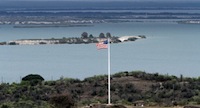 On May 16th, a New York state federal judge granted a preliminary injunction to block provisions of the NDAA that allow indefinite detention, claiming they are unconstitutional. The decision is part of growing bipartisan opposition to the NDAA that includes prominent members of the US military.
On May 16th, a New York state federal judge granted a preliminary injunction to block provisions of the NDAA that allow indefinite detention, claiming they are unconstitutional. The decision is part of growing bipartisan opposition to the NDAA that includes prominent members of the US military.
U.S. District Judge Katherine Forrest, originally appointed by Obama, clashed with the current administration by censuring the NDAA, saying that the act has a "chilling impact on First Amendment rights" to free speech, and infringes on the Fifth Amendment's right to due process.
The suit for the injuction was brought by the Stop the NDAA! group, pictured below left to right: Pulitzer Prize winner Chris Hedges; US military analyst Daniel Ellsberg (who released the Pentagon Papers); famed linguist and philosopher Noam Chomsky; Icelandic parliamentarian Birgitta Jónsdóttir; executive director of RevolutionTruth Jennifer Bolen; activist Kai Wargalla; and activist, founder of US Day of Rage, and WL Central reporter Alexa O'Brien.
The plaintiffs argued that the wording of section 1021 in the act was so vague that journalists, activists and protestors could be included among those whom the military could detain indefinitely and without charge. Judge Forrest agreed:
At the hearing on this motion, the government was unwilling or unable to state that these plaintiffs would not be subject to indefinite detention under [section] 1021. Plaintiffs are therefore at risk of detention, of losing their liberty, potentially for many years... An individual could run the risk of substantially supporting or directly supporting an associated force without even being aware that he or she was doing so... In the face of what could be indeterminate military detention, due process requires more.
In response, the 'Stop the NDAA!' group declared the ruling a victory and stated that it opened the way for further legal action against the act.
Judge Forrest's decision to block the provision for indefinite detention reflects an increasing level of anxiety felt by members of both the Republican and Democratic parties about the negative impact of the NDAA on civil liberties. And the concern is shared by the military as well: the very same day Judge Forrest issued the injunction, a nonpartisan group of forty retired US generals and admirals signed a letter urging congressmen to vote for the Smith-Amash Amendment, which would have banned indefinite detention within the United States and repealed the policy mandating military custody for foreign terrorism suspects.
Given that national security was the underlying argument for passage of the NDAA in the first place, the fact that respected members of the US military are now openly critical of the provisions concerning indefinite detention is highly significant.
Moreover, the Smith-Amash Amendment was not the only NDAA amendment under consideration in Congress at that time. There was also a second amendment addressing the issue of indefinite detention of US citizens: the Gohmert-Landry-Rigell-Duncan-Barletta Amendment brought forward by Republican congressmen. While the Smith-Amash Amendment failed, the Gohmert-Landry Amendment passed; and although many would argue that the Gohmart-Landry Amendment didn't go far enough in protecting civil liberties, its passage reflects the growing perception in both parties that the NDAA is fundamentally flawed and needs to be changed.
Theme by Danetsoft and Danang Probo Sayekti inspired by Maksimer